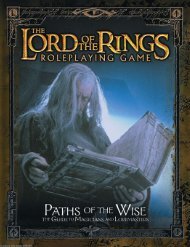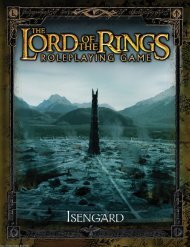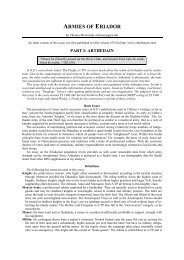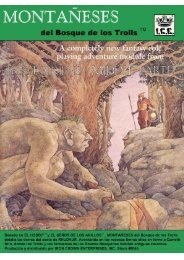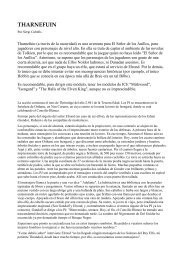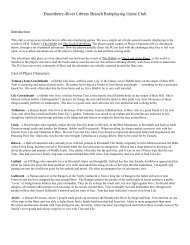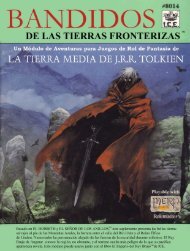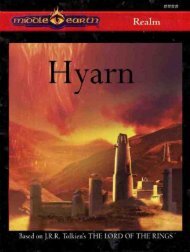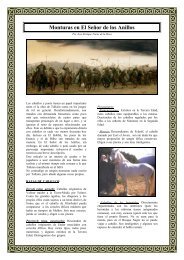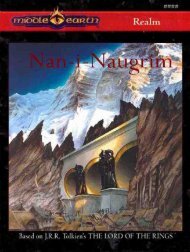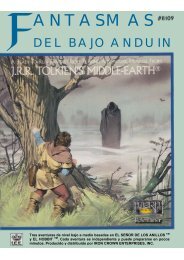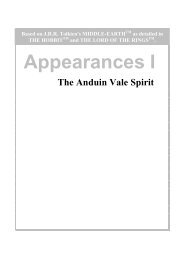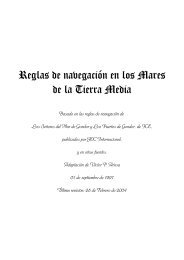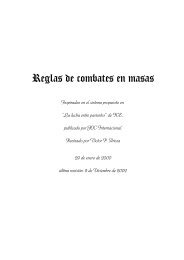Vinyar Tengwar 39 - Fan Modules - Free
Vinyar Tengwar 39 - Fan Modules - Free
Vinyar Tengwar 39 - Fan Modules - Free
Create successful ePaper yourself
Turn your PDF publications into a flip-book with our unique Google optimized e-Paper software.
————————————— <strong>Vinyar</strong> <strong>Tengwar</strong> 41 (July 2000) ———————————<br />
√ken see, perceive, note, kenda- intensive watch, sc. not ‘guard’ but observe<br />
for some time (to gain information etc.). Often used for ‘reading’.<br />
[The Etymologies gives the base KHEN-D-E- 'eye'. Cf. ken- 'see, behold' (MC:222),<br />
and VT <strong>39</strong>:32-33 s.v. kenta.]<br />
√men move, proceed (in a direction intended by a person) menta send, cause<br />
to go (in a desired direction).<br />
[The Etymologies gives the base MEN- whence Q. men ‘place, spot’. Cf. o-mentie<br />
‘meeting or junction of the directions of two people’, XI367, whence omentielvo ‘of the<br />
meeting of our ways’, ibid, and LR:79; and yomenie ‘meeting, gathering’ (of three or<br />
more coming from different directions), XI:407n.1.]<br />
√nir will, intention, conscious resolve to move, or do. nira an individual will<br />
(or potential), nirme exercise of will, an act of will.<br />
√pak close, shut (opposite of √lat): avalatya. pahta closed, shut, private.<br />
√khap bind, make fast, restrain, deprive of liberty, avalerya. √kham. Cf.<br />
√khep retain, keep, do not give away or release, keep hold of.<br />
[The Etymologies gives the base KHAP- ‘enfold’. The significance of the citation of<br />
√kham, which on the manuscript is written directly below √khap, is unclear; it may be<br />
intended as an alternative form. Etymologies has KHAM- ‘sit’. With √khep cf. S. úchebin<br />
‘I have not kept’ in Gilraen’s linnod, LR:1036.]<br />
√lek loose, unbind, let, permit.<br />
[The Etymologies gives the base LEK- ‘loose, let loose, release’. Cf. lehta ‘free,<br />
released’, VT <strong>39</strong>:17—18.]<br />
√pol can, have physical power and ability [as in] “I can jump that”, polin<br />
quete means “I can speak (because mouth and tongue are free)”.<br />
[The Etymologies gives the base POL-, POLOD- ‘physically strong’.]<br />
√isi know, istan pole [sic; read istan quete] = “I can speak (because I have<br />
learned (a) language)”.<br />
[The Etymologies gives the base IS-, whence Q. ista- ‘know’.]<br />
√ler am free to do, sc, am under no restraint (physical or other), lerta quete<br />
[sic, read lertan quete] – “I can speak because I [am] free to do [so] there



